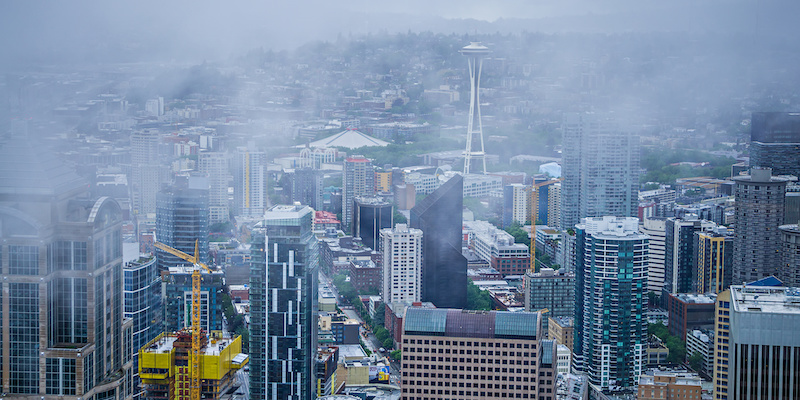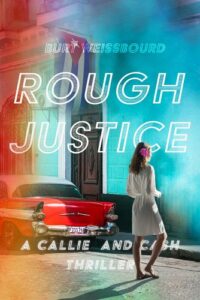I’m writing my seventh thriller, and six of them have been set in Seattle. What is it about Seattle, and the Seattle area, that makes it such a compelling place, such an attractive place to write thrillers? Why do I always come back to Seattle when I could write about New York City or Los Angeles or Chicago or Paris, other places where I have lived? For me, Seattle is a hidden jewel, an original, never-ending cache of unexpected surprises.
I love writing about Seattle’s eccentricities, its quirks, its unique culture, its vibrant street life, the kids who are trying to create a place for themselves, the high school children in the young Shakespeare workshop producing his plays outside in public places, like a market, all summer long, the fresh fish vendors throwing fish for sale in the Pike Place Market, the gum wall – the long brick wall covered in used chewing gum, the outrageous wondrous things that so many people do, without calling attention to it. It’s a place where people come to reinvent themselves, and if you watch carefully, they actually do it.
*
There’s a wonderful 1989 movie, THE FABULOUS BAKER BOYS, made in Seattle, that makes my point. In this movie The Baker brothers, Jeff and Beau Bridges, work together playing piano duets at middle level Seattle hotels, bars and so on. They’re quintessential Seattle characters, drifting, never talking too much about where they are or where they want to go. They’re having trouble getting work, and they decide to bring on a singer. They rent a small cluttered, nondescript space, a piano and place an ad. People start to come and none of them are right. When they’ve finished, unsuccessful, the brothers start to pack up. A woman comes in, unrecognizable, unfashionably dressed, no representative, no introduction, no description of her, her experience and so on. When they ask if she’s ever performed, the answer is no. Her occupation, she’s a call girl for an escort service. She’s chewing a large piece of bubble gum. Reluctantly, the brothers say they’ll hear her sing. She asks them to play More than you know, puts down the bubble gum, starts, then stops, asks the pianist, Jeff Bridges, to start again, slower. He begins again, then slowly, in small increments—it’s magical. This woman, Michelle Pfeiffer, is simply a marvelous singer, and the adventure begins. This is a very Seattle, unexpected surprise. This woman is reinventing herself, by herself, with no help, no agent, no group of admirers, fans, or friends, and in that instance, she becomes someone else.
This Seattle characteristic, people reinventing themselves – and others leaving them alone, accepting their new identities – has played an important role in how I develop my characters, especially the villains, the antagonists, in all of my books. In Inside Passage, the first book in the Corey Logan Trilogy, Nick Season, the frontrunner for state Attorney General is the same man who framed Corey and sent her to prison by threatening her young son’s life. Nick is a monster, a pathological liar, a killer, a gigolo, and a razor smart, ruthless psychopath. This complicated, frightening thriller was more plausible in Seattle. Primarily, because Nick Season was able to reinvent himself, present himself convincingly as an exciting, even inspiring, candidate for State Attorney General and no one, except Corey, ever suspected, who he really was.
In Danger in Plain Sight, the monstrous couple, the devil incarnate, our villians, Avi and Christy Ben Meyer, are masquerading as part of Seattle’s elite. These people are so confident in their elite status, that they regularly dine at The Bronze Pig, our heroine’s restaurant. Again, people are accepting their new identities, and they’re not even suspected of the first crime in the book – when Callie’s ex-husband is struck by a truck in front of her restaurant and blown through the front window of the The Bronze Pig.
The ability to create plausible unsuspected criminals is only a piece of the pleasure of writing in Seattle. Writing in Seattle, one of the great delights is simply using the many varied landscapes in and around the city, as well as capturing the unique appearance of Seattlites. It’s a place where the wilderness is close by, and people know how to use it, where there are wonderful, unexpected restaurants, where you can fly fish all day floating the Yakima after driving over the mountains, then be at a fine splendidly run restaurant for a late dinner at Bell Town. People also look varied, unpredictable, and unique. They don’t dress like LA or NYC or anyplace else, and it’s not uncommon for people to ignore contemporary fashion and create their own.
The unique Seattle culture makes it possible, easier, to write, to invent unexpected relationships. In the Corey Logan trilogy, Corey falls in love with Abe Stein, the psychiatrist who’s evaluating her to get her son back. Two more different people would be hard to imagine. Something happens between them, effortlessly. It’s as if they are able to connect, to understand each other, straightaway, without talking about it. When it happens, it’s just done, it’s never doubted or second guessed. They see it, they reach for it, and they evolve right into it. It was a treat to write.
In Danger in Plain Sight, Callie discovers that her bartender, Cash Logan, is smuggling erotic ivory carvings, netsuke, into her restaurant. Callie pitches a fit, has him arrested, then famously says, “When you get out of jail, don’t ever come back here.”
The challenge in this entire book is to make these absolutely incompatible people fall in love. What helps make this happen is that in their different ways, they’re both Seattleites. They’re not afraid of unconventional feelings, of doing something totally unexpected, out of character, outside of their supposed comfort zone. As they change, they’re each comfortable with who they are, as unconventional as that might be.
Again, this is a very Seattle type of relationship. Unexpected, no one chasing after it, neither of them aware of what’s happening until after it happens. And when it happens, it’s done, unshakeable, forever.
Seattle’s unique people and culture have, without me always being aware of it, helped me evolve as a writer. When I first began writing my book, Inside passage, I spent time with a young Seattle woman, who’d spent summers in Alaska, fishing commercially for salmon. She taught me about the long summer days, the potentially harsh weather conditions, the demanding life on a boat and so on. In doing so, she helped me understand, create, and finally write Corey Logan, an archetypal Seattle woman.
*
Two of my novels brought me to the inner-connected worlds of private school kids and the runaways who roam Seattle streets. I talked with Youth Care and spent time at their Orion Center learning about homeless teenagers. This is an ongoing issue in Seattle, and the growing numbers of homeless people make it a very real problem. It’s not a good situation, but it’s possible to learn about it, to think about its complexity as it evolves.
In Seattle, it’s all there to see, good and bad, and there are lots of concerned people who will talk with you about it. The city is not so big and not so politically set up that all you get is a dogmatic point of view. For me, it’s been a good place to explore things that aren’t working and small enough that you have a chance to talk with influencers. In my experience, Seattleites genuinely care about their city, what works, what doesn’t, and what needs to change. They often disagree and certainly they can be opinionated. At the end of the day though, it’s a great place to think about, to examine and finally to write about things I care about.
***


















